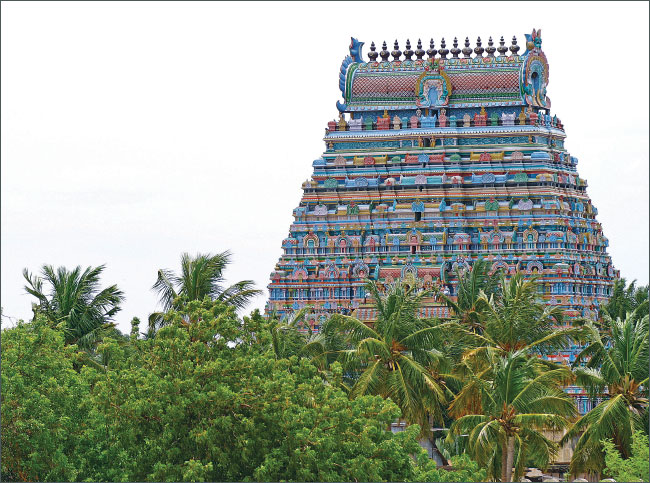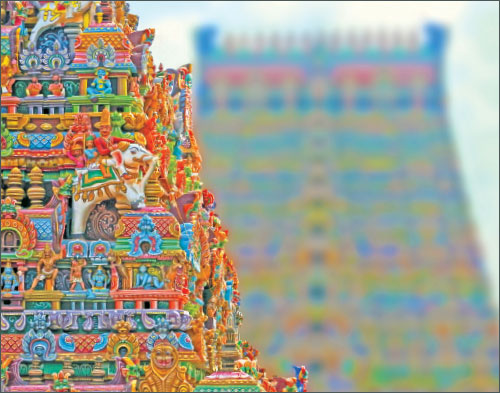Posted Date : 06:00 (22/05/2018) May 22, 2018 Sakti Vikatan
Revised Nov 12, 2018
என்.ஜி.மணிகண்டன்

இந்திரா செளந்தர்ராஜன்
Srī Vaikuntam! In the middle of Parantāmaṉ’s Tāmasa Nidra as if he is dreaming, he sported a smile on his face. Hrdayavāsini (= The Dweller in the heart: Lakshmi Devi, his consort) seeing the smile was pleased and surprised. Parantāmaṉ’s blue eyes opened like blossoms. His first Darśan was Lakshmi sporting a smile.
She asked him, “Prabhu, did your administrative Nidra come to a completion?” Nidra = Sleep. Yoga Nidra = Yogic Sleep.
Parantāmaṉ: “Lakshmi, there is no end to it. To take a rest, I opened the eye-blossoms.” Lakṣmi looked at him with greater surprise.
Parantāmaṉ: You are brimming with wonder. Why?”
He continued his conversation with a greeting and a question.
Lakṣmi: “Yes! For all lifeforms sleep is rest. For Emperumāṉ, awakening is rest. How could I remain without wondering about it?

Parantāmaṉ: “Devi, events more wonderous than this, are happening now.”
Lakṣmi: “That is why I see your smile during your sleep.”
Parantāmaṉ: Without answering the question, he showed his pride. “I realize from your question that you always meditate on my holy face.”
But, Tirumakaḷ (Lakṣmi) did not let go of him.
Lakṣmi: “Could I be privileged to learn of your wonderous events that you hinted.”
Parantāmaṉ: “Could I not praise you, Devi?”
Lakṣmi: “I abide on your chest. We are not separate from each other: Could I not say it?”
Parantāmaṉ: “That is the refutable Truth.”
Parantāmaṉ: “Brahma does not seem to grasp the truth as much as you do.”
Lakṣmi: “What a spectacle?”
Parantāmaṉ: “Spectacle it is. I smiled thinking of it.”
Lakshmi: You may elaborate on it.”
Parantāmaṉ: Don’t you know my Archa Rūpam that is Praṇavākāra Vimāṇa Rūpam?” (Archa Rūpam = Manifested image form for worship: SriRanganathar in Srirangam, Varadaraja Perumal of Kanchi and Sri Venkateswara of Tirupati.
Lakshmi: What kind of a question is it? That Praṇavākāra Vimāṇam was formed by your subtle energy to bring a sense of proportionality and plenitude to Brahma.”
Parantāmaṉ: You said it rightly. What puts him on the righteous path: Could it make him a lesser god? That is what I am thinking about now.”
Lakshmi: “Can Braḥmam diminish in stature?”
Parantāmaṉ: “In Satyaloka, there are daily Pujas. Brahman is in a state of agitation wondering whether he might lose Praṇavākāra. Agitation of Brahma is a deficiency.”
Lakshmi: “If it is so, did Asuras device a plan to get to you by targeting Praṇavākāram?”
Parantāmaṉ: Adadā! If that happens, it will be nice.”
Lakshmi: It is apparent that Asuras are not the cause. Why don’t you tell me the events without beating around the bush?
Parantāmaṉ: You are biding on my chest. Don’t you know the thoughts arising in me?
Lakshmi: You mean to say, “listen closely.”
Parantāmaṉ: “I asked you to listen closely and carefully. Let it slide! I will come to the point. Ikṣvāku, the king of Ayodhya in Bhūlōka and the son of seventh Manu, is meditating on Brahma for the acquisition of Prānavākāra Vimanam for him, his friends and acquaintances. Brahma is in a state of trepidation and confusion wondering whether Ikṣvāku’s austerity will come true and whether he will lose the Vimanam.
Lakṣmi: Prabhu, is Vivasvān’s son, a Baktha, of such greatness?”
Parantāmaṉ: The creator of Vivasvān’s son is Brahman. How pitiable it is that the creator got entangled with his own creation?”
Lakshmi: By expressing that sentiment, aren’t you entangled yourself?”
Hearing Lakṣmi’s question, Bhagavan smilingly answered, “Say ‘We’ instead of ‘You.’”

Lakṣmi: “Yes! Ikṣvāku’s austerity not only woke you up from your Nidra but also made you hold a long conversation with me. That being so, the greatness of his Tapas can be ascertained and confirmed. Prabhu, what next?”
Parantāmaṉ: “Why don’t you say it?”
Lakshmi: “You held the sattvic view one should live with no egoism of ‘I, Me, and Mine.’ Your subtle power created that Praṇavākāra Vimanam. The devotion to the Vimanam should begin with Brahma himself. With that notion, you gave the Vimanam to Braḥma.
Lakshmi: “Brahma established that devotion in Vivasvān and in turn Vivasvān in Ikṣvāku. Ikṣvāku is the king of the world. When such a devotee gets the Praṇavākāra and worships it, your favor and grace spread all over the world, and people will receive blessings with the seven treasures: peace, wealth, joy, devotion, wisdom, health, and liberation. Your holy thoughts and divine will that the people should enjoy these seven treasures are the reason you gave it to Brahma.”
Parantāmaṉ was pleased with the cogent presentation by Lakṣmi and said, “Lakshmi, you pervade me so thoroughly you understood my divine thoughts clearly and gave a voice to them. What you uttered is the self-evident truth: The mind by egoless Bakthi (devotion) will become strong just like the body becomes strong by nutritious foods.
Parantāmaṉ: Mental strength morphs into the force of the soul. Even the strong body loses strength with advancing age. However, the power of the soul does not diminish with the passage of time but increases multiple times. The lives originating from me can come back to merge with me only by the strength (and purity) of the soul. That was the reason for the formation of Praṇavākāra Vimanam and my Kōlam (appearance)in Nidra. My devotees get the combined benefit of worshipping a multitude of gods, Sapta ṛṣis (seven Rishis), Aṣṭavasus (eight Vasus), Dvādaśa Ādityas (20 Ādityas), and Nine Planetary gods. To put it succinctly, life in the world is like playing a part in a drama on the stage. Since I am the director of that play, my name is Araṅganāthaṉ (Lord of the stage).
Lakshmi listening to the explanation by Parantāmaṉ interrupted him and said, “It is not the head; Head, that he is.” Parantāmaṉ smiled. It was as if he agreed with her statement. It also sounded like, ‘Enough spoken; let us get to business.’
Satyalokam!
Srī Nārāyaṇa's entry exhilarated Brahmadeva.
Brahma: “My Father, I would have come to Vaikuntam the moment you thought of me. Since you came in person, I caused injury and inconvenience to you.” He paid homage to him.
Parantāmaṉ: An earthling influenced your mind. That made you talk like an earthling. Let that slide. Are you perturbed and confused?”
Brahma: “Perturbation, yes Prabhu. The cause is not unknown to you. When your Praṇavākāra moved to the Bhūlōka, daily Pūjās should take place with no deficiency. When the installation is subjected to Yuga Māyā, what should take place in that instance is the undertone of my mental agitation.”
Parantāmaṉ: “The ball of the earth is subject to the duality of night and day. Virtue and evil are the admixtures in the life of humans. That duality may have repercussions upon Praṇavākāram. However, Praṇavākāram will suppress the evil and advance the cause of virtue in the lives of people. That desire was the cause of the formation of Praṇavākāra Vimanam and my descent as Araṅganātha. Do you understand only when I present it to you in explicit terms?”
Brahma stood obsequiously before Parantāmaṉ. Brahma: “My dear Emperuman, though I knew, I exhibited confusion and agitation in my desire to hear from your mouth. The green sprout, as long as it remains in the tree, is called a tree. If it falls and hits the ground, the twig becomes withered leaves. In truth, the tree and the dead twig are non-different and one. Time gives each its individuality and applies different names to them. Here I remain as the creator and a surrogate of yours in the name of Brahman. You are the God of gods. You do the bidding as to what I should do.”
Parantāmaṉ: Take these to Ikṣvāku. My Supreme Sovereign entities went to Satyaloka and then to Bhuloka. Let that be so. Therefore, the imminent (future) place of their stay will be Bhuloka Vaikuntam.”
Brahma: “For that to happen as said by you, please bless me with Anugraham (Divine help).”
Brahma showed humility and submissiveness. Parantāmaṉ conferred his blessings and disappeared.
Sarayu riverside: Ikṣvāku’s place of Austerity.
Ikṣvāku’s great Tapas saw all seasons and continued with the tireless strength of mind.
Ikṣvāku held in his mind the guise and form of ‘Om Srīraṅganāthāmā.’ The sounds of ‘Om Srīraṅganāthāmā’ were falling off his lips, so they reverberated throughout the riverbank and changed the surroundings.
An aromatic tree felled by lightning long ago sprouted leaves! The deer and the tiger forgot their natural behavior (antipathy) and stood together on the riverside. Near their hooves and legs, the crocodiles sunbathed but did not eat the animals, meant to be their food. They did not even entertain the idea to eat them.
Srīraṅganāthāmā’ the sound and the reach of the word had the power to control nature. How much power should the originator of the word have? Tender emotions moved Vasistar, the ordainer of Tapas when he noticed the surroundings of the Sarayu riverside.
Braḥma Jñāṉis do not understand or have regard for smallness or bigness. They come into form and focus only on the comparison. Jñāṉis do not make that mistake. One Braḥma jñāni will not rejoice at the appearance of another of equal worth. He takes as it is. He had the fullness of the soul. Vasiṣtar had that fullness.
How would it be if a vine has a tree to grab? Likewise, the people of the world thought of getting Araṅganātha Peruman through the good offices of Ikṣvāku. The signs of such an event appeared in the sky.